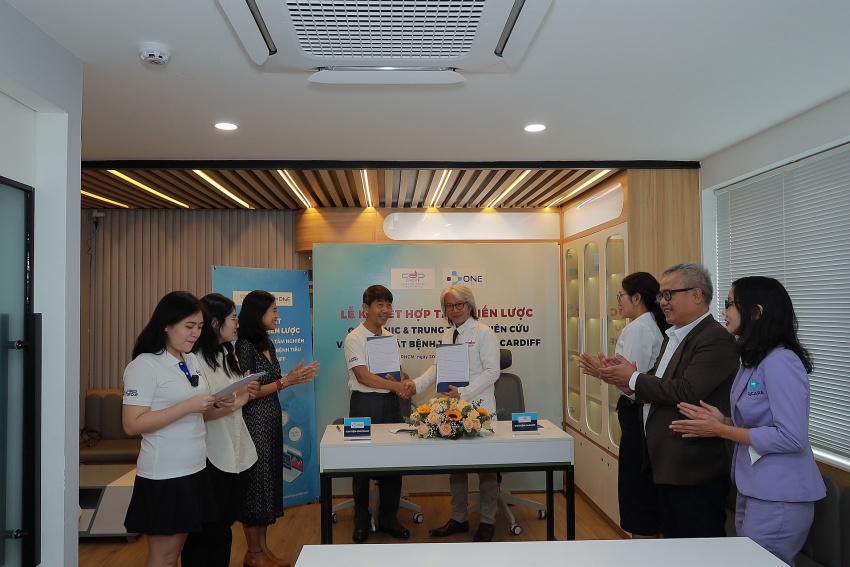Optimising diabetes treatment with digital enablers
The two sides will partner in the development of diabetes medical records and the application of IT solutions in the management of clinics.
Specifically, OneClinic's system for electronic medical and personal health records helps increase operational efficiency for clinics and improves the quality of medical examinations and treatments for patients.
Doctors can easily manipulate and build specialised diabetes medical records, and patients can self-monitor their health and know the status of the treatment, especially for chronic non-communicable diseases that need continuous monitoring and regular treatment such as cardiovascular disease, stroke, cancer, lung disease, diabetes, and mental disorders.
 |
At the signing ceremony, Nguyen Francis Tuan Anh, director of OneClinic emphasised, “OneClinic is an ecosystem that connects and integrates software, medical devices, and patient data to improve patient engagement, increase quality, and save treatment costs. OneClinic aspires to become one of the leading providers of healthcare solutions for private clinics.”
Tuan Anh continued, “These solutions are developed based on the latest technologies that meet the standards of the International Health Database and International Health Information Security and are compatible with current systems."
| In Vietnam, more than 3.5 million people are suffering from diabetes. |
Diabetes is still an urgent issue and is always the top concern in public healthcare. The disease causes many dangerous complications, being the leading cause of cardiovascular disease, blindness, kidney failure, and amputation.
According to the International Diabetes Federation's statistics, in 2019, 463 million people aged 20-79 had diabetes worldwide. It is expected that diabetes will affect 578 million people by 2030 and 700 million people by 2045.
 |
| The application of technology in healthcare treatment is promising much relief for patients |
In Vietnam, more than 3.5 million people are suffering from diabetes. The proportion of people with diabetes mellitus increases rapidly. It is expected that the number of people with diabetes in Vietnam will increase to nearly 6.3 million by 2045.
However, the solutions in the management and treatment of diabetes so far are still limited. There are difficulties for doctors in monitoring blood glucose levels and handling timely prescriptions. Likewise, patients sometimes miss or forget to visit the clinics periodically to monitor subclinical tests.
Since there are no tools to manage patient data, doctors will only be able to provide services to a finite number of patients. In addition, it is difficult for diabetics to meet the high cost of treatment, lacking timely interaction with doctors to be warned of the risk of complications.
According to Dr. Le Minh Quang from the Cardiff Diabetes Centre, the application of technology in the healthcare sector becomes increasingly important, including in the management of chronic diseases like diabetes. Medtech helps doctors better treat and manage more diabetes patients, contributing to improving their life quality.
The partnership between the two sides is expected to help overcome the problems of the management of the clinic system and medical records in the care of chronic diseases, opening a new level in treatment and management.
 | INFOMED Vietnam wins the world’s first patent for electronic medical records INFOMED Vietnam has won the patent for a blockchain-secured and document-based electronic medical records (EMR) system from the US Patent and Trademark Office, making it the first patent of this kind in the world. |
 | VMED Group leads way in pioneering med-tech solutions With an ambition to increase high-quality healthcare access to local people, VMED Group is instigating development of new med-tech solutions to reach more health facilities nationwide. |
 | VMED Group - Medtech for the new normal Accompanying the development and addressing the challenges of the healthcare sector, VMED Group is pioneering innovative medical solutions to drive healthcare transformation and improve treatment quality and efficacy. |
What the stars mean:
★ Poor ★ ★ Promising ★★★ Good ★★★★ Very good ★★★★★ Exceptional
Themes: Healthcare Platform
- PM outlines new tasks for healthcare sector
- Opella and Long Chau join forces to enhance digestive and bone health
- Hanoi intensifies airport monitoring amid Nipah disease risks
- Cosmetics rules set for overhaul under draft decree
- Policy obstacles being addressed in drug licensing and renewal
Related Contents
Latest News
More News
- Agro-forestry and fisheries exports jump nearly 30 per cent in January (February 09, 2026 | 17:45)
- Canada trade minister to visit Vietnam and Singapore (February 09, 2026 | 17:37)
- New tax incentives to benefit startups and SMEs (February 09, 2026 | 17:27)
- Vietnam forest protection initiative launched (February 07, 2026 | 09:00)
- China buys $1.5bn of Vietnam farm produce in early 2026 (February 06, 2026 | 20:00)
- Vietnam-South Africa strategic partnership boosts business links (February 06, 2026 | 13:28)
- Mondelez Kinh Do renews the spirit of togetherness (February 06, 2026 | 09:35)
- Seafood exports rise in January (February 05, 2026 | 17:31)
- Accelerating digitalisation of air traffic services in Vietnam (February 05, 2026 | 17:30)
- Ekko raises $4.2 million to improve employee retention and financial wellbeing (February 05, 2026 | 17:28)

 Tag:
Tag:
























 Mobile Version
Mobile Version